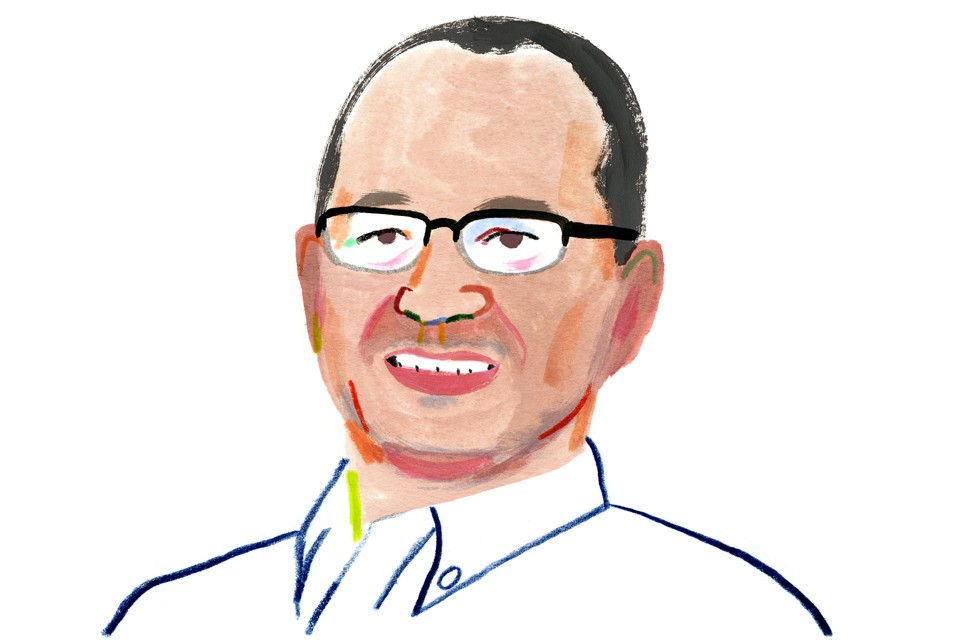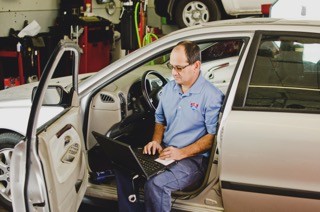
Shane Edwards, an auto technician turned business owner in Kansas City, Missouri, talks about the future of servicing more advanced vehicles.
The Model T automobile, produced by Ford Motor company in 1908, cost just $850 at the time. While it wasn't the first automobile on the market, it was the most affordable option for many Americans, which in turn put more drivers on the road.
With the arrival of those cars came a need for a new kind of worker: people who could fix automobiles. It was a job that could provide a decent income and didn't require a college degree. Automobile technology has advanced measurably since those days, so much so that tech giants such as Google, Tesla, and Uber are fighting to get Americans out of the driver’s seat by way of self-driving cars. In turn, efforts to make cars safer, more autonomous, and more energy-efficient have created a shortage of technicians with the skills to work on the technologically advanced vehicles.
Shane Edwards owns an auto-service business in Kansas City, Missouri, that specializes in computer diagnostics. For The Atlantic’s series of interviews with American workers, I spoke with Sevart about his transition from technician to business owner, why he hired a business coach, and how electric and driverless cars are changing the traditional auto industry. The interview that follows has been lightly edited for length and clarity.
Adrienne Green: What inspired you to become an auto technician?
Shane Edwards: Today, I am the president of I-70 Auto Service in Kansas City, which is a business my father opened. We've been in business for 40 years, and I've been a part of it for 37 years. I started working here when I was 14 years old, and I’ve only stepped away from it for three years after graduating high school. My dad asked me to come back and help him run the business in 1983, and I have been running it ever since.
Green: What kind of work did you do as a 14-year-old in your dad’s shop?
Sevart: I was in school, so my dad would bring me down on the weekends. At that point, we were a full-service gas station, so I pumped the gas and checked people's oil, transmission fluid, and tires. I would do all of this out on the drive no matter what the weather was like—raining, snowing, zero degrees, or 100 degrees. When I got old enough to drive, my father bought me a car and said, “This car is for you to get to and from work when you're out of school.” School ended at 2:20 p.m., and I would drive down to Kansas City to work from 3 p.m. until the shop closed at 7 p.m. Then I went home to do homework, and did the same thing the next day.
Green: What was it like to transition from being a technician to a business-owner?
Sevart: Before, I did a lot of car maintenance, and then got an education on how to actually fix cars. I became a pretty good technician, and worked on a lot of electrical stuff and diagnostics. I prided myself on fixing vehicles that other shops couldn't fix.
In 2010, I hired a business coach, which was the smartest move I ever made. My business coach told me that I needed to decide if I wanted to work on the business or in the business. So I started hiring better staff, and I walked away from working on cars to start managing processes, procedures, and marketing. Today, I very seldom ever actually go out and work on a car. It'd have to be something that my staff is having difficulties with and seeking my guidance. My passion is fixing cars, but I had to learn to run a profitable business and do it the correct way.

Sevart, runs diagnostics on a vehicle (1-70 Auto Service)
Green: How'd you come to the decision to get the business coach?
Sevart: Many people that start family-owned shops have no formal training, or they're a good technician who doesn’t know how to run a business. I was ashamed, because I was a business owner, but I really didn't know numbers. I would get stuff from the accountant, and I would just file it without looking at it. All I wanted to do was fix cars. At my first meeting with my coach, they talked about things that I didn't understand because I didn't have a business degree. I just knew how to fix cars, and I never even went to school for that.
Green: What is an average day like for you?
Sevart: When I was a technician, I would come in and pick the job that I wanted since I owned the place. I was thinking about nothing except fixing that car. Today, as a business owner, most mornings I come in and greet my staff, and audit our invoices from the previous day to check efficiencies and productivity. My technicians clock in and out of jobs, so I check daily to see if we have a bottleneck: Is our parts supplier not getting us parts fast enough? Or is our service advisor not getting the jobs bid quick enough?
source: https://www.theatlantic.com/business/archive/2016/10/auto-mechanic-technician/502976/